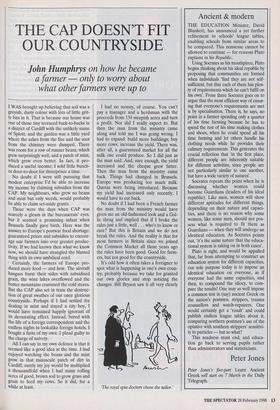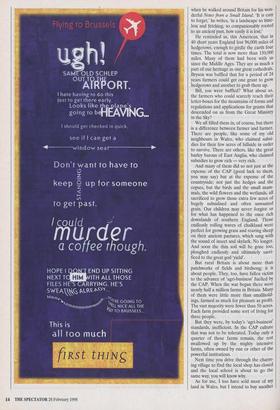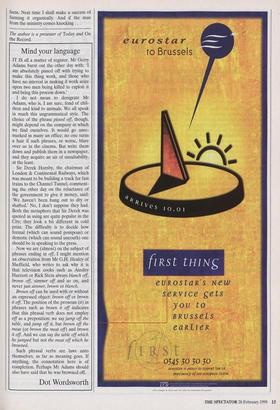THE CAP DOESN'T FIT OUR COUNTRYSIDE
John Humphrys on how he became
a farmer — only to worry about what other farmers were up to
I WAS brought up believing that soil was a greyish, dusty colour with lots of little grit- ty bits in it. That is because our house was one of those tiny terraced back-to-backs in a district of Cardiff with the unlikely name of Splott, and the garden was a little yard where the ashes from the fire and the soot from the chimney were dumped. There was room for a row of runner beans, which grew surprisingly well, and a patch of mint, which grew even better. In fact, it pro- duced a useful income; I sold little bunch- es door-to-door for threepence a time.
No doubt if I were still pursuing that modest enterprise I'd be able to increase my income by claiming subsidies from the CAP. My neighbours, who grew no beans and mint but only weeds, would probably be able to claim set-aside grants.
Those were the days when CAP was scarcely a gleam in the bureaucrats' eyes, but it seemed a promising infant when Brussels finally gave birth. Here was the answer to Europe's postwar food shortage: guaranteed prices and subsidies to encour- age our farmers into ever greater produc- tivity. If we had known then what we know now, we should have strangled the blasted thing with its own umbilical cord.
Certainly, the farmers of Europe pro- duced more food — and how. The aircraft hangars burst their sides with subsidised grain, the wine lakes overflowed and the butter mountains crammed the cold stores. But the CAP also set in train the destruc- tion of great swathes of our once glorious countryside. Perhaps if I had settled for dealing in mint and stayed a city boy, I would have remained happily ignorant of its devastating effect. Instead, bored with the life of a foreign correspondent and the endless nights in lookalike foreign hotels, I bought a farm of my own. I plead guilty to the charge of naivety.
All I can say in my own defence is that it seemed like a good idea at the time. I had enjoyed watching the beans and the mint grow in that minuscule patch of dirt in Cardiff; surely my joy would be multiplied a thousandfold when I had many rolling acres of good, brown soil to grow grass and grain to feed my cows. So it did, for a while at least. I had no money, of course. You can't pay a manager and a herdsman with the proceeds from 134 steepish acres and turn a profit. Nor did I really expect to. But then the man from the ministry came along and told me I was going wrong. I had to expand: build more buildings; buy more cows; increase the yield. There was, after all, a guaranteed market for all the milk one could produce. So I did just as the man said. And, sure enough, the yield increased and the cheque grew fatter. Then the man from the ministry came back. Things had changed in Brussels. Europe was producing too much milk. Quotas were being introduced. Because my yield had increased only recently, I would have to cut back.
No doubt if I had been a French farmer the man from the ministry would have given me an old-fashioned look and a Gal- lic shrug and implied that if I broke the rules just a little, well . . who's to know or care? But this is Britain and we do not break the rules. And the reality is that for most farmers in Britain since we joined the Common Market all those years ago the rules have been good. Good for farm- ers, but not good for the countryside.
It's odd how it often takes a foreigner to spot what is happening in one's own coun- try; probably because we take for granted our own glories and stop noticing the changes. Bill Bryson saw it all very clearly The royal spin doctors chose the tailor.' when he walked around Britain for his won- derful Notes from a Small Island. 'It is easy to forget,' he writes, 'in a landscape so time- less and fetching, so companionably rooted to an ancient past, how easily it is lost.'
He reminded us, this American, that in 40 short years England lost 96,000 miles of hedgerows, enough to girdle the earth four times. The total is now more than 150,000 miles. Many of them had been with us since the Middle Ages. They are as much a part of our heritage as our great cathedrals. Bryson was baffled that for a period of 24 years farmers could get one grant to grow hedgerows and another to grub them up.
Bill, you were baffled? What about us, the farmers who could scarcely reach their letter-boxes for the mountains of forms and regulations and applications for grants that descended on us from the Great Ministry in the Sky?
We all filled them in, of course, but there is a difference between farmer and farmer. There are people, like some of my old neighbours in Wales, who claimed subsi- dies for their few acres of hillside in order to survive. There are others, like the great barley barons of East Anglia, who claimed subsidies to grow rich — very rich.
And many of them did so not just at the expense of the CAP (good luck to them, you may say) but at the expense of the countryside; not just the hedges and the copses, but the birds and the small mam- mals, the wild flowers and the wetlands, all sacrificed to grow those extra few acres of hugely subsidised and often unwanted grain. Our children may never forgive us for what has happened to the once rich downlands of southern England. Those endlessly rolling waves of chalkland were perfect for growing grass and rearing sheep on their ancient pastures, which sang with the sound of insect and skylark. No longer. And soon the thin soil will be gone too, ploughed endlessly and ultimately sacri- ficed to the great god 'yield'.
But rural Britain is about more than patchworks of fields and birdsong; it is about people. They, too, have fallen victim to the advance of `agri-business' fuelled by the CAP. When the war began there were nearly half a million farms in Britain. Many of them were little more than smallhold- ings, farmed as much for pleasure as profit. The vast majority were fewer than 50 acres. Each farm provided some sort of living for three people.
But they were, by today's `agri-business' standards, inefficient. In the CAP culture that was not to be tolerated. Today only a quarter of those farms remain, the rest swallowed up by the mighty intensive farms, often owned by one or other of the powerful institutions.
Next time you drive through the charm- ing village to find the local shop has closed and the local school is about to go the same way, you will know why.
As for me, I too have sold most of my land in Wales, but I intend to buy another farm. Next time I shall make a success of farming it organically. And if the man from the ministry comes knocking . . .
The author is a presenter of Today and On the Record.




























































 Previous page
Previous page